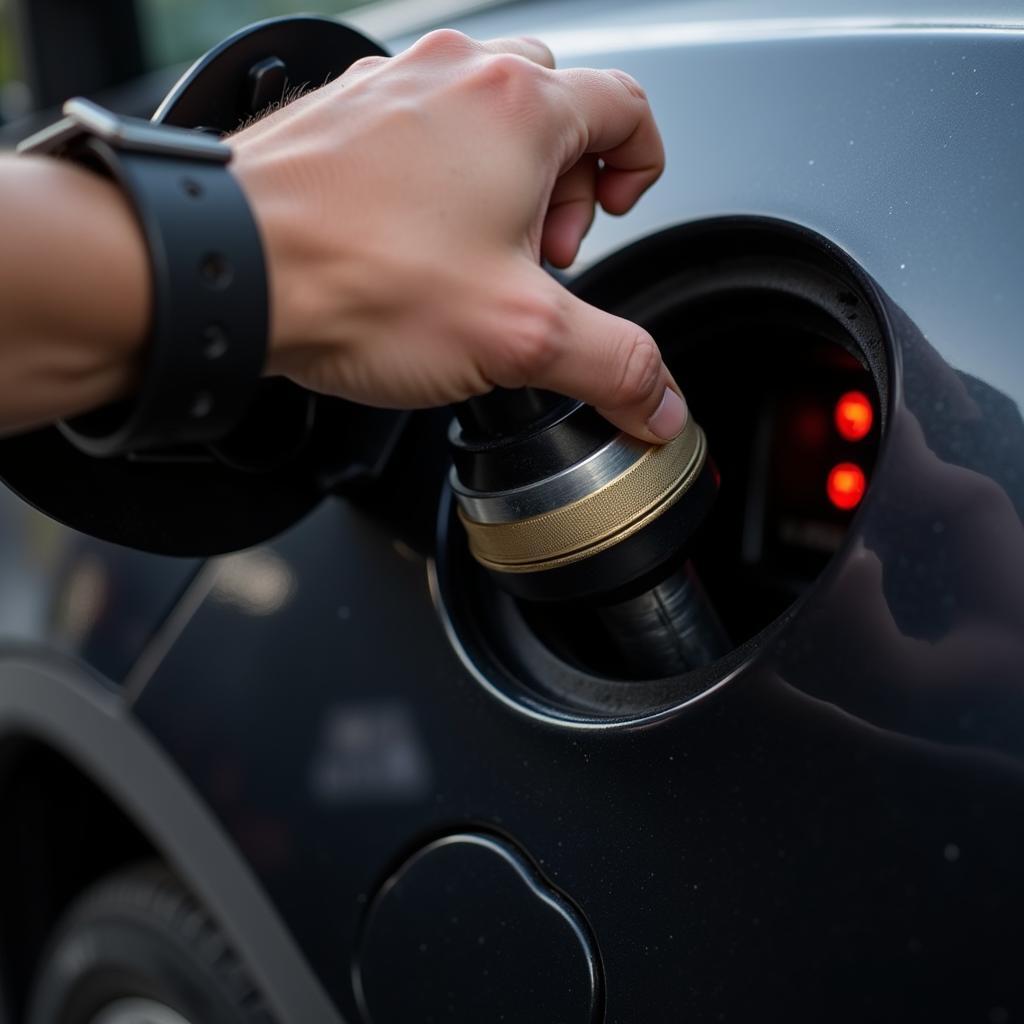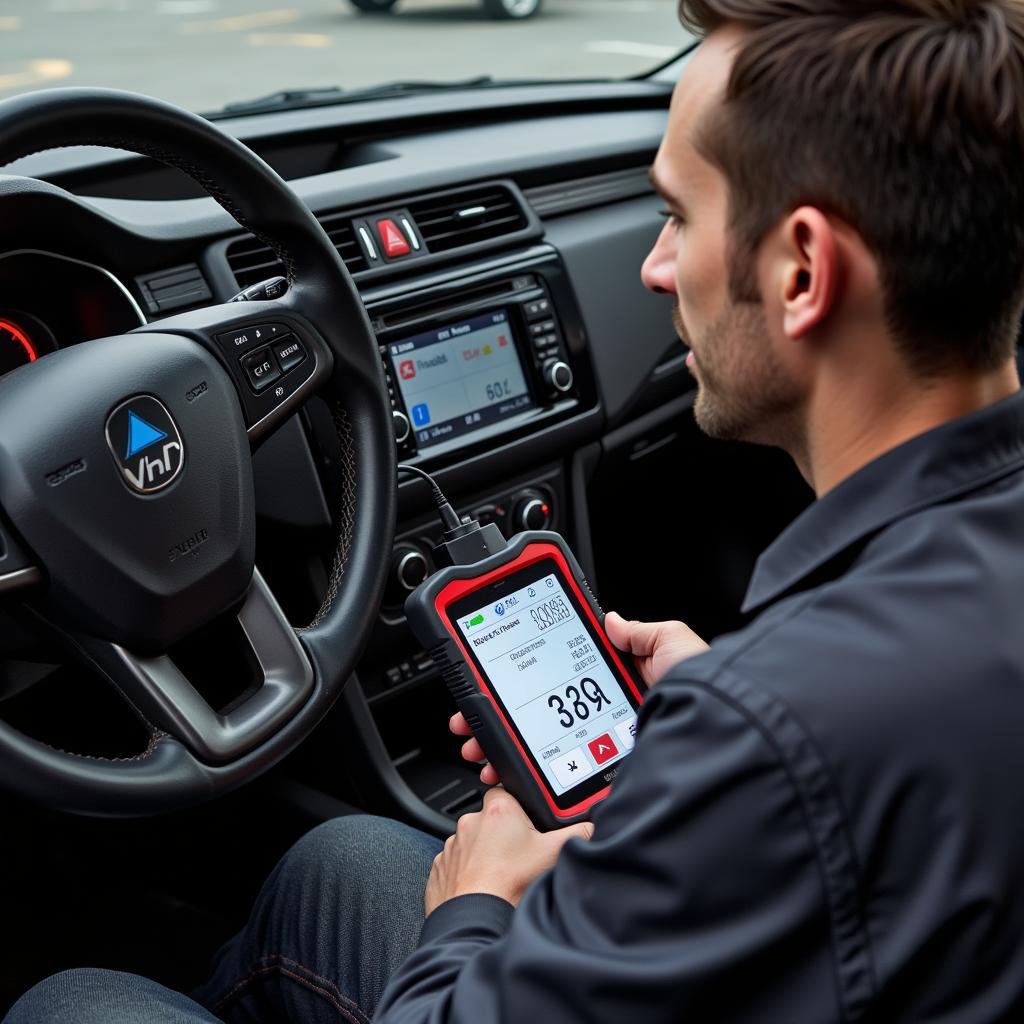Have you ever experienced the frustrating scenario of filling up your gas tank, only to find your car struggling to start? This can be a perplexing issue, leaving you stranded and wondering, “why does my car have problem starting after I get gas?” Let’s dive into the potential causes and solutions to this common automotive problem.
Common Culprits Behind Post-Gas Station Starting Problems
Several factors can contribute to starting issues after refueling. Understanding these potential culprits can help you diagnose the problem and get back on the road quickly.
Evaporative Emission System (EVAP) Issues
The EVAP system is designed to prevent fuel vapors from escaping into the atmosphere. A malfunctioning EVAP system, particularly a stuck or faulty purge valve, can sometimes be triggered by refueling and interfere with the engine’s starting process.
Fuel Pump Problems
While not directly related to refueling, a failing fuel pump can manifest as starting problems after getting gas. The added weight of the fuel in a full tank can exacerbate an existing fuel pump issue, making it more noticeable.
Loose or Damaged Gas Cap
A loose or damaged gas cap can disrupt the pressure within the fuel system and cause starting difficulties. It might seem trivial, but a properly sealed gas cap is essential for maintaining the correct fuel system pressure.
 Loose Gas Cap Causing Car Starting Problems
Loose Gas Cap Causing Car Starting Problems
Sensor Malfunctions
Various sensors, such as the crankshaft position sensor or the mass airflow sensor, play a crucial role in the engine’s starting process. A malfunctioning sensor can cause intermittent starting problems, sometimes coinciding with refueling.
Troubleshooting and Solutions: Getting Your Car Back on Track
Now that we’ve explored the potential causes let’s delve into some troubleshooting steps and solutions to address this frustrating issue.
Check the Gas Cap
First, ensure the gas cap is securely tightened. It might sound obvious, but a loose gas cap is often the easiest fix.
Inspect the Fuel Pump
If the gas cap isn’t the culprit, the next step is to inspect the fuel pump. Listen for a humming sound coming from the fuel tank when you turn the key to the “on” position. If you don’t hear anything, it could indicate a fuel pump issue.
Examine the EVAP System
Checking the EVAP system can be more complex and might require a professional mechanic. They can diagnose problems with the purge valve or other components of the EVAP system.
 Mechanic Diagnosing EVAP System Issues
Mechanic Diagnosing EVAP System Issues
Verify Sensor Functionality
Diagnosing sensor malfunctions typically requires specialized equipment. A mechanic can use a diagnostic scanner to check for error codes related to sensors and pinpoint the faulty component.
Why Does My Car Have Problem Starting After I Get Gas? Expert Insights
“Often, drivers overlook the simplest solutions, like a loose gas cap,” says John Smith, a seasoned automotive technician with over 20 years of experience. “It’s always the first thing I check when a car has starting problems after refueling.”
Preventing Future Starting Problems
Regular maintenance is key to preventing many car problems, including post-refueling starting issues. Keeping your fuel system clean, regularly inspecting your gas cap, and addressing any check engine lights promptly can help avoid these frustrating situations.
Conclusion: Don’t Let Starting Problems Stall Your Journey
Experiencing starting problems after getting gas can be a real headache, but understanding the potential causes and solutions can empower you to address the issue effectively. From checking the gas cap to inspecting the fuel pump and EVAP system, these troubleshooting steps can help you get your car running smoothly again. For professional assistance or further guidance, feel free to connect with AutoTipPro at +1 (641) 206-8880. Our office is located at 500 N St Mary’s St, San Antonio, TX 78205, United States. We are here to help you get back on the road!
FAQ
-
Could bad gas cause my car to have trouble starting? Yes, contaminated or low-quality fuel can certainly contribute to starting problems.
-
How can I tell if my fuel pump is failing? Signs of a failing fuel pump include sputtering, loss of power, and difficulty starting, especially with a full tank.
-
Is it safe to drive with a check engine light on? While it’s sometimes possible to drive short distances, it’s best to get your car checked by a mechanic as soon as possible.
-
How often should I replace my gas cap? It’s generally recommended to replace your gas cap every few years or if it becomes damaged.
-
Can extreme temperatures affect my car’s starting ability? Yes, both extreme heat and cold can impact battery performance and other components, potentially leading to starting issues.
-
What is the EVAP system, and why is it important? The EVAP system prevents fuel vapors from escaping into the atmosphere, reducing pollution and improving fuel efficiency.
-
Should I try to fix car starting problems myself? While some simple checks like the gas cap can be done DIY, more complex issues often require professional expertise.




Leave a Reply